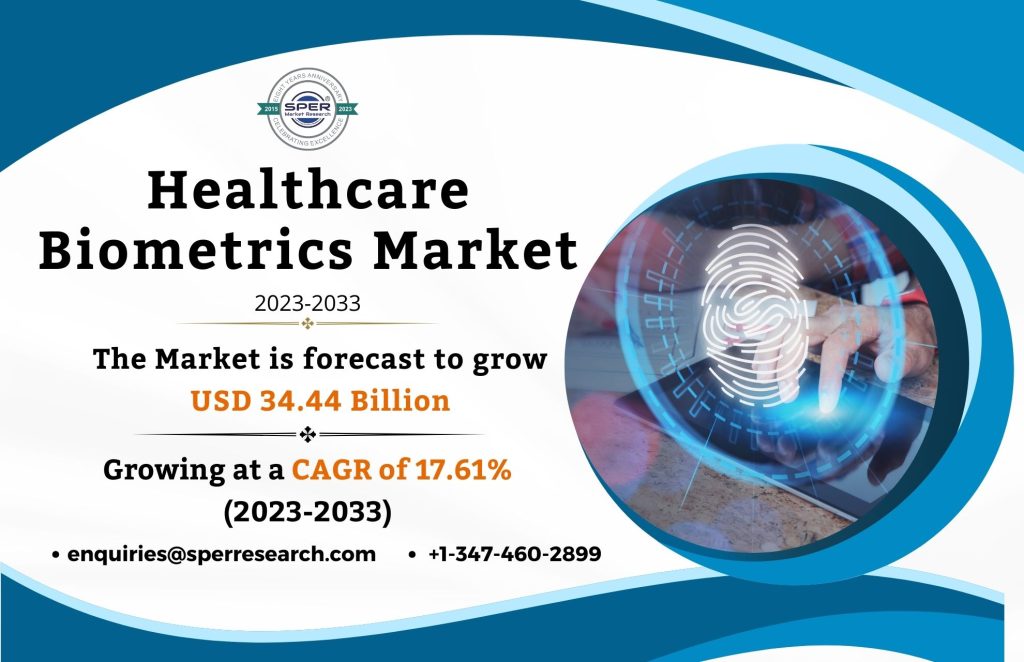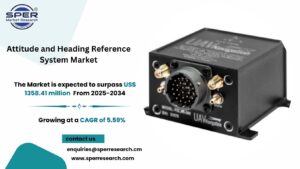Healthcare Biometrics Market Growth 2023- Global Industry Share, Emerging Trends, Revenue, Business Challenges, Opportunities and Future Investment till 2033: SPER Market Research

Biometrics is mostly used in healthcare for patient identification and user access control. Biometric identifiers—like face, iris, palm veins and prints DNA, fingerprints, retina, etc. are often used. To identify, verify, and recognize individuals for secure access to systems and data, electronic technologies capture and identify their unique traits. The two primary technologies for authentication are multi-factor and single-factor. Healthcare biometrics offers several benefits, such as data center and medical record security, remote patient monitoring, care provider authentication, etc. Thus, clinics, clinical and research laboratories, hospitals, etc. often employ biometrics in healthcare.
According to SPER market research, ‘Healthcare Biometrics Market Size- By Technology, By Application, By End User- Regional Outlook, Competitive Strategies and Segment Forecast to 2033’ state that the Healthcare Biometrics Market is predicted to reach USD 34.44 billion by 2033 with a CAGR of 17.61%.
Growing Need for Security in the Medical Field: In the healthcare industry, security has always been crucial to protecting patient privacy, medical records, and sensitive data. By identifying each user’s distinct bodily characteristics, biometric technologies evaluate biological data about them and utilize those attributes as a template or future reference for user identification. Globally, healthcare institutions are putting more and more emphasis on deploying biometric security solutions for patient identification and connecting such systems to the patients’ electronic health records. Among the many benefits provided by biometrics are patient identity integrity, effective and secure data collection, prevention of medical fraud, and decreased inventory theft.
Hospital and clinic administration must make additional investments because to the substantial expense of the healthcare biometric system. Patients must pay more for their treatments as a result, raising the system’s overall cost of healthcare. This turns out to be a hindering element in the market’s expansion. There are several problems that can occur while utilizing a biometric scanner that are challenging for a human operator to fix. When a user enters incorrect personal information into the system, the outcome is erroneous and uncomfortable for them. Compared to other biometric technologies, iris and retina scanners are more expensive. Thus, the high implementation cost limits the market for healthcare biometrics.
Request For Free Sample Report @ https://www.sperresearch.com/report-store/healthcare-biometrics-market.aspx?sample=1
Impact of COVID-19 on Global Healthcare Biometrics Market
The COVID-19 pandemic has had a positive impact on the market due to the government’s preventive measures to curb the virus’s spread and the consequent necessity for contactless technology to give patient care in remote or healthcare institutions. To deliver effective and all-encompassing treatment, medical personnel are depending on healthcare biometrics technologies to collect patient data. COVID-19 will have long-term, substantial repercussions that developers, investors, clients, and biometrics firms will have to deal with. The most direct effect of COVID-19 is that in order to combat the growing threat, contactless technologies like face and iris recognition are now necessary.
Global Healthcare Biometrics Market Key Players:
Geographically, the healthcare biometrics market in North America is anticipated to have the most market share worldwide. This is explained by the widespread adoption and enforcement of healthcare fraud control systems in the United States. In the next years, the North American healthcare biometrics market is anticipated to be driven by the availability of cutting-edge healthcare infrastructure and technical advancements. Key players are Bio-Key International, Biometrics, Crossmatch Technologies, 3M Cogent, Inc., Fujitsu Limited, Integrated Biometrics, Imprivata Inc., IDEMIA, NEC CORPORATION.
Healthcare Biometrics Market Segmentation:
The SPER Market Research report seeks to give market dynamics, demand, and supply forecasts for the years up to 2033. This report contains statistics on product type segment growth estimates and forecasts.
By Technology: Based on the Technology, Global Healthcare Biometrics Market is segmented as; Single-Factor Authentication, Multi-Factor Authentication, Signature Recognition, Voice Recognition, Other Behavioural Recognition. Multi-Factor Recognition, Biometrics with PIN, Two-Factor Biometrics, Three-Factor Biometrics.
By Application: Based on the Application, Global Healthcare Biometrics Market is segmented as; Patient Identification & Tracking, Medical Record Security & Data Centre Security, Care Provider Authentication, Home/Remote Patient Monitoring, Pharmacy Dispensing, Others.
By End User: Based on the End User, Global Healthcare Biometrics Market is segmented as; Hospitals & Clinics, Hospital Institutions, Research & Clinical Laboratories, Respiratory Distress Syndrome.
By Region: This research also includes data for North America, Asia-Pacific, Latin America, Middle East & Africa and Europe.
This study also encompasses various drivers and restraining factors of this market for the forecast period. Various growth opportunities are also discussed in the report.
For More Information, refer to below link:-
Healthcare Biometrics Market Future Outlook
Related Reports:
Follow Us –
LinkedIn | Instagram | Facebook | Twitter
Contact Us:
Sara Lopes, Business Consultant — U.S.A.
SPER Market Research
+1-347-460-2899





